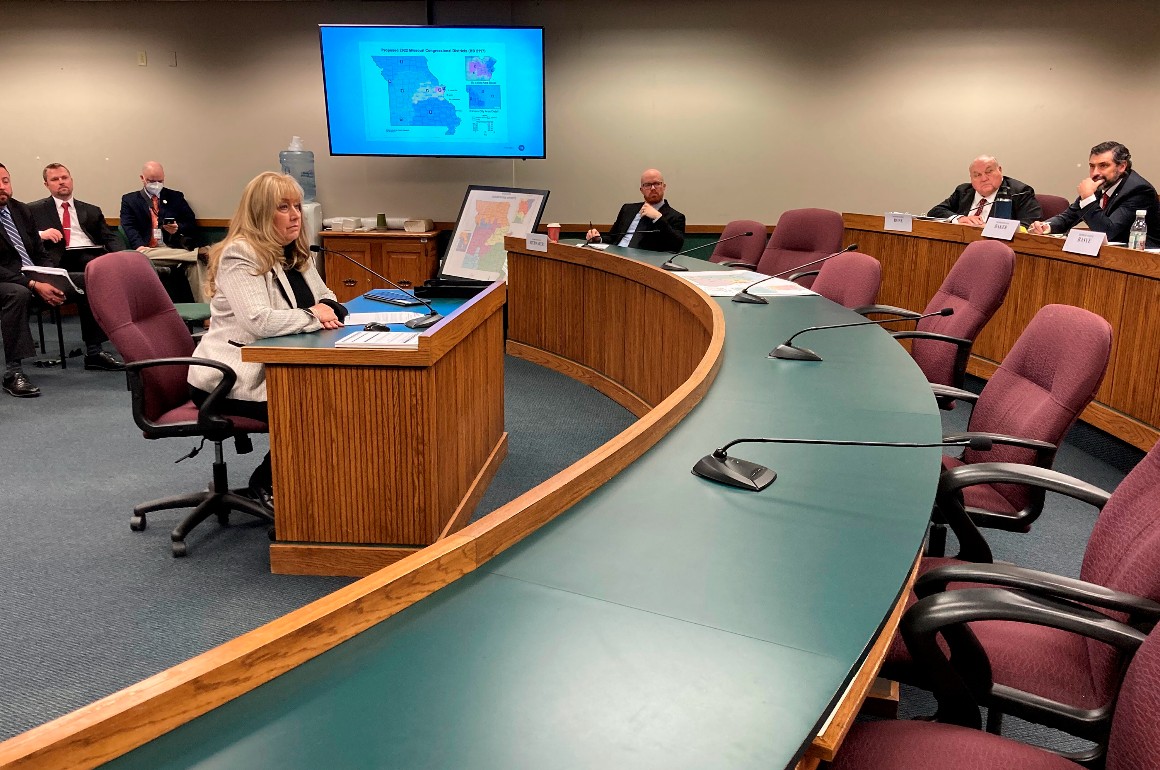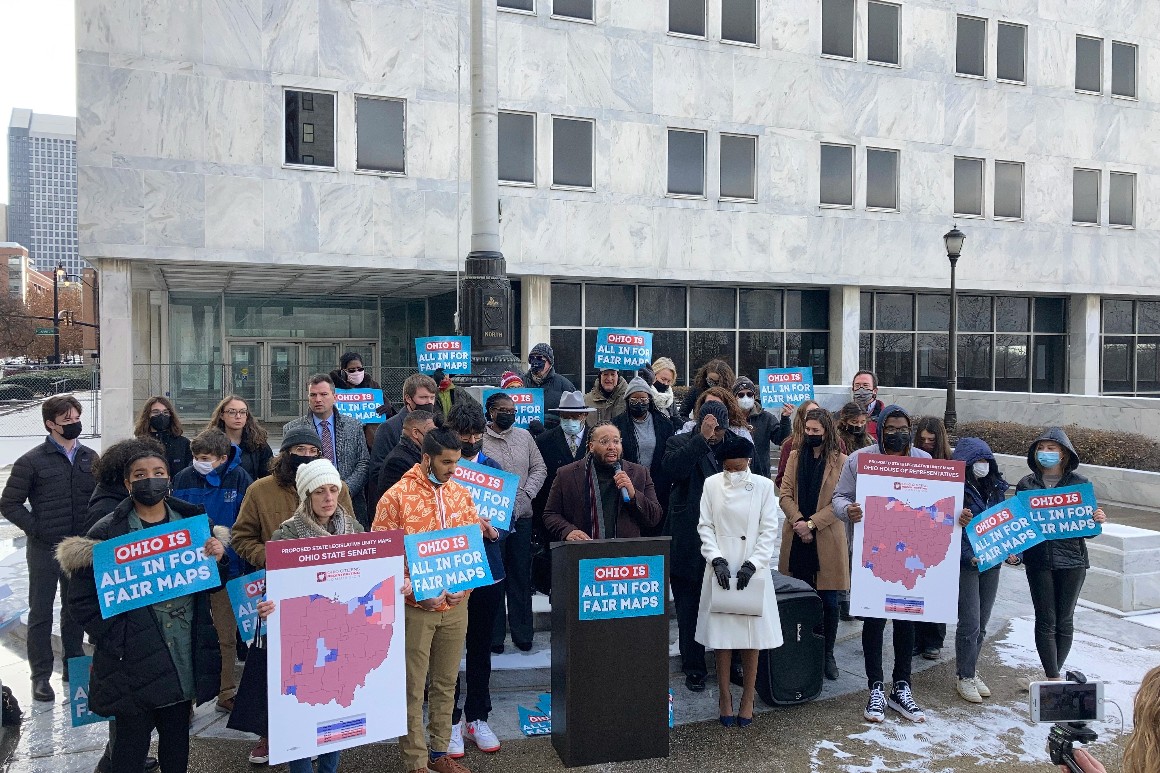
Republican mapmakers in Missouri weren’t expecting an intra-party fracas when they unveiled a redistricting proposal that would help the GOP maintain their lock on six of the state’s eight congressional seats.
The chief source of the backlash, which is powered by the secretary of state and two Senate candidates: Why not gerrymander more to relegate Democrats to only one district?
“We’re moving down the route of appeasement of the minority in our state,” said GOP state Sen. Bill Eigel, who has mounted a pressure campaign that could culminate in a filibuster over any attempt to pass a layout that would not evict Democratic Rep. Emanuel Cleaver from his Kansas City-based seat.
“The folks here in Missouri will find out who wants to support a 7-1 map,” he said, “and who wants to give away a couple seats in Congress.”

Republicans have mostly played it safe in the states that have completed redistricting so far, locking in the status quo with durable maps that are more likely to withstand demographic changes and legal muster. But amid a growing sense of frustration that the party is squandering its advantage, some in the GOP are advocating for a new level of ruthlessness. It’s a stance driven by a desire to appease an activist base, bolster ambitious politicians and gain retribution against audacious Democratic gerrymandering in blue strongholds.
The aggression on display in Missouri is also cropping up elsewhere. In Tennessee, Republicans are already successfully advancing a plan to crack Nashville into three districts, dooming Democratic Rep. Jim Cooper. In Florida, Gov. Ron DeSantis was so displeased with his legislature’s proposals to redraw their maps that he suggested one that could give Republicans 18 or more of the state’s 28 districts. Kansas Republicans this week revealed a plan that would crack the Kansas City area into two districts, though they could have gone even further in targeting Rep. Sharice Davids (D-Kan.).
That could mark a departure from the strategy in states like Kentucky, Nebraska, Indiana and Georgia, where Republican legislators declined to use their redistricting pens to eliminate several Democratic seats with little to no opposition or complaints. And in larger places like Texas, mapmakers prioritized incumbent protection over creating more competitive seats or vigorously going after Democratic incumbents.
And while Republicans feel confident they can claim the majority this fall, questions linger over how durable it would be in tougher political environments. To add to their concerns: Democrats have missed no chance to carve aggressive gerrymanders in states like Illinois, Oregon, Nevada and New Mexico that can pose high risk when the party is facing national headwinds, but high rewards in a more favorable climate.
“If you look at what goes on in Illinois, those guys cut the hearts out of two Republicans,” said Rep. Don Bacon (R-Neb.), who represents a swingy Omaha district that did not get more favorable, though Republicans drew the map for the next decade. “It seems to me the Democrats appear to be more ruthless in this redistricting effort.”
In Missouri, leadership has been steadfast in their desire to leave Kansas City intact, citing the potential for lawsuits in the liberal-leaning state Supreme Court, the high vote threshold needed to pass a map that will go into effect before the primary and honoring communities of interest. The state House on Wednesday sent a map likely to produce a 6-2 result to the state Senate.
“I have serious questions about the viability of a 7-and-1 map, with the courts, and also, even with the matter of constitutionality,” said Missouri state Rep. Ben Baker, a member of the state House Redistricting Committee. “I think what you see is people that are running for higher office would like to use this as campaign material to pander to the base. And I think that's unfortunate.”
But the detractors, who include Secretary of State Jay Ashcroft and Senate candidates Rep. Billy Long (R-Mo.) and former Gov. Eric Greitens, insist all that could be overcome.
And some are particularly incensed by the layout of Republican Rep. Ann Wagner’s suburban St. Louis seat in the map passed by the state House. Then-President Donald Trump would have carried the redistricted version by a relatively narrow margin in 2020, compared to other versions in which Wagner's seat was much redder.
The conflict could come to a head soon with a state Senate filibuster showdown.
“I just watch from a distance and hope that the wisdom of maintaining some semblance of a two-party system in the state of Missouri is what ends up getting approved,” said Cleaver, the potentially endangered Democratic incumbent. “Obviously, it's challenging and frustrating.”
Similarly contentious is the redistricting spat in Florida, which has 28 seats up for grabs. The state legislature's two chambers were already tussling over how far to go in undoing a 2015 state Supreme court ruling that turned two Republican districts into new Democratic-leaning seats held ever since by Reps. Charlie Crist and Stephanie Murphy.
The state Senate has pushed a status-quo map reviled by many state and national Republicans. Then DeSantis weighed in with an even more drastic option that could claw back the seats of Crist and Murphy and even target seats held by two Black Democrats. (Murphy is retiring, and Crist is running against DeSantis for governor.)
“I agree with what the governor proposed,” said GOP state Rep. Anthony Sabatini, who is running for Murphy’s now-open seat. He also took a shot at the state Senate: “I think you have weak leadership in the Senate that doesn't have any interest in any national questions.”
A state constitutional amendment approved by voters prohibits legislators from considering partisanship when crafting maps. But DeSantis and Sen. Rick Scott, his predecessor as governor, have packed the state Supreme Court with conservative justices since 2015, and some in the legislature view his proposed map as a sign he is plotting a veto if a less aggressive map reaches his desk.
“If you're a lawyer like me, and you understand the Voting Rights Act, you understand Florida case law, you understand the court that's in power right now. There's no legal fear,” said Sabatini. “If you're a doofus and don't know what you're doing — and there's a lot of people like that in state government because they're not qualified to hold office,” he added, “then, yeah, I mean, it's scary.”
Top party strategists have urged some level of restraint throughout the cycle, advocating for legislators to draw “10-year maps” that the party can hold until the next redistricting in 2032. But privately, some GOP operatives are fuming that some states have left seats on the table out of fear or myopic thinking.
In Georgia, mapmakers left largely untouched Rep. Sanford Bishop’s (D-Ga.) southwest Georgia seat, which is not protected under the Voting Rights Act. And in northwest Indiana, mapmakers declined to overwhelm the city of Gary with red counties to oust freshman Rep. Frank Mrvan (D-Ind.).
“I had concerns like all members, but it worked out,” said Mrvan. “I realized that very often they do choose to keep communities of interests in line.”
Republicans in Nebraska’s unicameral legislature were stymied by a Democratic filibuster — but they did not really attempt to play hardball, even though their state is one of two that allocates Electoral College votes by congressional district, and Bacon’s district could sway a tight presidential election.
But the rural-urban divide, between Omaha and the rest of the state, was also a determining factor. Kansas has to navigate a similar split. The leadership’s preferred proposal released this week would threaten Davids, but the new district would have gone for Joe Biden in the last presidential election. And they seem to have decided against pursuing another configuration that would upend any chance at her reelection by grouping parts of Kansas City with the rural areas to the northwest.
In Kentucky, Republicans chose not to crack Louisville, home to the only Democratic-held district of the the six in the state — even after the incumbent, Rep. John Yarmuth, decided to retire.
Democratic Gov. Andy Beshear vetoed the Kentucky map on Wednesday, calling it a Republican gerrymander. But the GOP has enough votes in the state legislature to override it.
“It would be such a disturbance to the existing districts, and you have five incumbent Republicans who are running again,” said Rep. Thomas Massie (R-Ky.). “The national interest is probably one way, and the state interest is probably the other. And I think the state interest won out. If the NRCC were drawing the map, I think you'd have a 6-0 state.”
Because redistricting is a state-by-state process, party strategists don’t draw all the maps — and any national effort to maximize House seats often finds itself superseded by parochial concerns in state capitals.
“It is embarrassing that Republican legislatures are pulling punches in redistricting while Democrats are out for blood. Any Republican who backs a Pelosi-friendly map this cycle should be forced to litigate that vote in a future primary,” said one national GOP strategist involved in House races who was granted anonymity to discuss internal party strategy.
Redistricting has always been a litigious endeavor, but Republicans are confronting an increasingly pugnacious Democratic legal operation. The National Democratic Redistricting Committee, formed in 2016 and helmed by Obama-era Attorney General Eric Holder, stockpiled millions of dollars to challenge GOP-drawn maps as unconstitutional partisan gerrymanders, particularly in state courts.
Their efforts in the run-up to 2021 have created legal precedents to rein in some mapmakers — and spook others.
“It's not the threat of the lawsuit. It's the threat of losing the lawsuit because they have lost, and the trajectory is against them,” said Kelly Ward Burton, the president of the NDRC.
“I think Eric Holder deserves a ton of credit for that," she added. "I think that there is real merit to the strategy that he's been leading and we’ve been running for five years.”

The Ohio state Supreme Court handed Democrats a massive victory last week, when it struck down a Republican-drawn map that could have given the GOP 13 of the 15 congressional seats. North Carolina’s top court has also expressed concern over Republican maps there.
“Democrats’ court fight — their brazenness with the courts and going deep political on the court scheming — that to me is much more interesting than what they did in Illinois or what they're going to do in New York,” said Rep. Patrick McHenry (R-N.C.).
----------------------------------------
By: Ally Mutnick
Title: GOP considers more ruthless redistricting
Sourced From: www.politico.com/news/2022/01/20/republicans-redistricting-more-ruthless-527445
Published Date: Thu, 20 Jan 2022 04:30:56 EST
Did you miss our previous article...
https://consumernewsnetwork.com/politics-us/colleyville-is-no-more-american-jews-cannot






